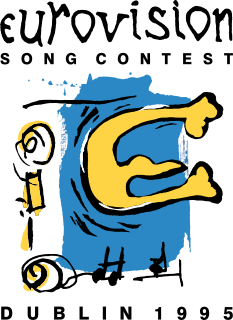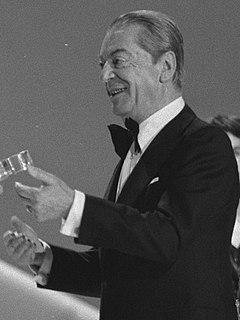
The Eurovision Song Contest 1995 was the 40th edition of the Eurovision Song Contest and took place in Dublin, Ireland for the second year in a row, following the country's third back-to-back victory at the 1994 contest with the song "Rock 'n' Roll Kids" by Paul Harrington and Charlie McGettigan. Organised by the European Broadcasting Union (EBU) and host broadcaster Raidió Teilifís Éireann (RTÉ), the contest was again held at the Point Theatre which was also the venue the year before. It was held on 13 May 1995 and was presented by Irish newsreader Mary Kennedy.

The Eurovision Song Contest 1994 was the 39th edition of the Eurovision Song Contest. It took place in Dublin, Ireland, following the country's victory at the 1993 contest with the song "In Your Eyes" by Niamh Kavanagh. It was the first time that any country had hosted the contest two years in a row. Organised by the European Broadcasting Union (EBU) and host broadcaster Raidió Teilifís Éireann (RTÉ), the contest was held at the Point Theatre on 30 April 1994. It was presented by former Irish broadcasters Cynthia Ní Mhurchú and Gerry Ryan. This remains the last time that the contest has been held in the month of April.

The Eurovision Song Contest 1981 was the 26th edition of the annual Eurovision Song Contest. It took place in Dublin, Ireland, following Johnny Logan's win at the 1980 contest in The Hague, Netherlands with the song "What's Another Year". The contest was held at the RDS Simmonscourt on 4 April 1981, and was hosted by Irish television journalist Doireann Ní Bhriain.

The Eurovision Song Contest 1997 was the 42nd edition of the Eurovision Song Contest. It took place in Dublin, Ireland, following the country's victory at the 1996 contest with the song "The Voice" by Eimear Quinn. It was the fourth time in five years that Ireland had hosted the contest – and a record sixth time that it was staged in Dublin. Organised by the European Broadcasting Union (EBU) and host broadcaster Raidió Teilifís Éireann (RTÉ), the contest was yet again held at the Point Theatre, on 3 May 1997. The contest was presented by Irish actress Carrie Crowley and Boyzone front-singer Ronan Keating who also sang in the interval act with Boyzone.

Ireland has participated in the Eurovision Song Contest 55 times since making its debut at the 1965 contest in Naples, missing only two contests since then. The contest final is broadcast in Ireland on RTÉ One. Ireland has a record total of seven wins, and is the only country to have won three times consecutively.

The Eurovision Song Contest was first held in 1956, originally conceived through a desire to unite European countries through cross-border television broadcasts following World War II, and in doing so to test the capabilities of international broadcast technology. Following a series of exchange broadcasts in 1954, the European Broadcasting Union (EBU) commissioned an international song competition, from an idea developed by Sergio Pugliese and Marcel Bezençon and originally based on the Italian Sanremo Music Festival.
Ireland participated in the Eurovision Song Contest 2006 with the song "Every Song Is a Cry for Love" written and performed by Brian Kennedy, who was internally selected in November 2005 by the Irish broadcaster Raidió Teilifís Éireann (RTÉ) to represent the nation at the 2006 contest in Athens, Greece. RTÉ organised the national final Eurosong 2006 to select the song that Kennedy would perform. Three songs faced a public televote, ultimately resulting in the selection of "Every Song Is a Cry for Love" as the Irish entry.

"Rock 'n' Roll Kids" is a song by Paul Harrington and Charlie McGettigan that was the winning song of the Eurovision Song Contest 1994, written by Brendan Graham and performed for Ireland. The song was Ireland's sixth overall victory, and represented an unprecedented third consecutive time that the same country had won the contest.
Ireland participated in the Eurovision Song Contest 2008 with the song "Irelande Douze Pointe" written by Darren Smith, Simon Fine and Dustin the Turkey. The song was performed by children's show puppet Dustin the Turkey. The Irish broadcaster Raidió Teilifís Éireann (RTÉ) organised the national final Eurosong 2008 in order to select the Irish entry for the 2008 contest in Belgrade, Serbia. Six songs faced a public televote, ultimately resulting in the selection of "Irelande Douze Pointe" performed by Dustin the Turkey as the Irish Eurovision entry.
Eimear Quinn represented Ireland in the 1996 Eurovision Song Contest with the song "The Voice".
Dawn Martin represented Ireland in the 1998 Eurovision Song Contest with the song "Is Always Over Now?".
For the 1989 Eurovision Song Contest in Lausanne, the song "The Real Me", written, composed and performed by Kiev Connolly, was chosen to represent Ireland when it won the national final selection.
Ireland was represented by Johnny Logan with the song "Hold Me Now" in the 1987 Eurovision Song Contest in Brussels.
Ireland was represented by Linda Martin, with the Johnny Logan-penned song "Terminal 3", at the 1984 Eurovision Song Contest, which took place on 5 May in Luxembourg City. "Terminal 3" was chosen as the Irish entry at the national final on 31 March.
Ireland participated in the Eurovision Song Contest 2013 with the song "Only Love Survives" written by Wez Devine and Ryan Dolan. The song was performed by Ryan Dolan. The Irish broadcaster Raidió Teilifís Éireann (RTÉ) organised the national final Eurosong 2013 in order to select the Irish entry for the 2013 contest in Malmö, Sweden. Five songs faced the votes of five regional juries and a public televote, ultimately resulting in the selection of "Only Love Survives" performed by Ryan Dolan as the Irish Eurovision entry.
Ireland participated in the Eurovision Song Contest 2014 with the song "Heartbeat" written by Jonas Gladnikoff, Rasmus Palmgren, Patrizia Helander and Hazel Kaneswaran. The song was performed by Can-linn featuring Kasey Smith. The Irish broadcaster Raidió Teilifís Éireann (RTÉ) organised the national final Eurosong 2014 in order to select the Irish entry for the 2014 contest in Copenhagen, Denmark. Five songs faced the votes of five regional juries and a public televote, ultimately resulting in the selection of "Heartbeat" performed by Can-linn featuring Kasey Smith as the Irish Eurovision entry.
Ireland participated in the Eurovision Song Contest 2016 with the song "Sunlight" written by Nicky Byrne, Wayne Hector and Ronan Hardiman. The song was performed by Nicky Byrne, who was internally selected in January 2016 by the Irish broadcaster Raidió Teilifís Éireann (RTÉ) to represent the nation at the 2016 contest in Stockholm, Sweden. "Sunlight" was presented as the Irish entry during the announcement of Byrne's internal selection on 13 January 2016.
Ireland participated in the Eurovision Song Contest 2019 with the song "22", performed by Sarah McTernan and written by Janieck Devy, Marcia "Misha" Sondeijker and Roel Rats. The song and the singer were internally selected in March 2019 by the Irish broadcaster Raidió Teilifís Éireann (RTÉ) to represent the nation at the contest in Tel Aviv, Israel.
The Czech Republic participated in the Eurovision Song Contest 2022 in Turin, Italy with the song "Lights Off" written by Einar Eriksen Kvaløy, Abi F Jones, Dominika Hasek, Casper Hatlestad and Benjamin Rekstad, and performed by Norwegian-Czech electronic music trio We Are Domi. The Czech broadcaster Česká televize (ČT) organised the national final Eurovision Song CZ 2022 in order to select the Czech entry for the 2022 contest. Seven entries competed in the national final, and the winner was announced on 16 December 2021 following the combination of votes from a twelve-member international jury panel, an international public vote and a Czech public vote.
Ireland participated in the Eurovision Song Contest 2022 in Turin, Italy with the song "That's Rich" performed by Brooke. The Irish broadcaster Raidió Teilifís Éireann (RTÉ) organised the national final Eurosong 2022 in order to select the Irish entry for the 2022 contest. Six songs faced the votes of a studio jury, an international jury and a public televote which determined the final selection.






